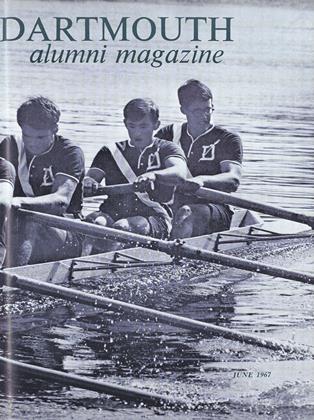To DR. EMERSON DAY '34, Director of New York's Strang Clinic for cancer detection and research, the idea of preventive medicine isn't so new. "The ancient Greeks had a system whereby they paid their doctors only for keeping them healthy," he says.
His up-to-date philosophy of preventive medicine sounds like a Cancer Fund commercial. He maintains that periodic checkups, made by "doctors who believe in them and are experienced in doing them," and early detection can "take the fangs out of cancer." And he adds:
"At the moment, one out of four cancer victims is being cured. Another one in four can be cured through regular examinations. New research is required for the other 50%."
For the past twenty years Dr. Day's teaching, research, hospital and clinical work has been related to preventive medicine and cancer control. For the last ten of his 17 years on the faculty of the Cornell University Medical College he served as Chief of the Division of Preventive Medicine at the SloanKettering Institute, 1954-64. In 1950 he had become Director of the Strang Cancer Prevention Clinic at New York's Memorial Hospital. In 1963 the Strang Clinic became an independent, nonprofit diagnostic center and moved to its own building in Manhattan. A staff of sixty doctors, assisted by seventy persons in nursing, technical and administrative areas, sees about 18,000 persons annually.
Dr. Day expects the numbers to grow. "But," he says, "there still seems to be a stigma attached to cancer. Some people think it's a socially undesirable disease, and if symptoms develop, they try to ignore them.
"We've got to get rid of this terrible head-in-the-sand aspect and take the wraps off the disease. We don't talk enough about the fact that cancer is now being cured. What we hear about are the failures, of which there are a discouraging number. But we must recognize that tremendous progress is being made, too."
Some of the progress is attributed to Dr. Day. His colleagues recognized this by awarding him the Bronze Medal of the American Cancer Society in 1956. In 1961 he won the Clement Cleveland Award given by the New York City Cancer Committee of the American Cancer Society for his "outstanding contribution to cancer educational work."
Accolades are a habit with Dr. Day. At Dartmouth, where he was Phi Beta Kappa and a Senior Fellow, he left his name on the Barrett Cup. At Harvard Medical School he was president of the Student Council. He is a Fellow of the New York Academy of Medicine and a past president of the New York Academy of Sciences and the American Society of Cytology. The French Government honored him in 1963 for his role at the Academy of Sciences, with the Officier de I'Ordre du Merite pour la Recherche et I'Invention. And in 1966 they gave him the Silver Medal of the "Societe d'Encouragement au Progres."
His career isn't entirely dominated by a series of successes. Dr. Day recalls an early episode when - after a wartime stint as an Army flight surgeon — he became medical director for Trans World Airlines' International Division. TWA attempted to develop a method for getting drinkable water from seawater:
"Six of us set out to sea in a raft, planning to stay 'oh, several days' testing the latest raft equipment. After twenty hours we were dragged ashore, having lost an average of five and one-half pounds per man and feeling a hell of a sight sorrier for the fellows stuck on rafts without any choice in the matter."
 View Full Issue
View Full Issue
More From This Issue
-
 Feature
FeatureProphecy in Painting
June 1967 By ROBERT REID and DOROTHY BECK -
 Feature
FeatureThe Wallace Affair
June 1967 By C.E.W. -
 Feature
FeatureRETIRING FACULTY
June 1967 -
 Feature
FeatureAN ATHLETIC SUMMING UP
June 1967 By CLIFFORD L. JORDAN '45 -
 Class Notes
Class Notes1959
June 1967 By RICHARD G. JAEGER, JAMES W. WOOSTER -
 Article
ArticleThe Undergraduate Chair
June 1967 By ART HAUPT '67
Article
-
 Article
ArticleFOOTBALL
December, 1911 -
 Article
ArticleCHRISTIAN ASSOCIATION PROSPERS IN MANY LINES
-
 Article
ArticleMEN OF HIGH SCHOLARSHIP ACTIVE ON THE CAMPUS
April, 1925 -
 Article
ArticleFive Seniors Receive Fulbright Scholarships
JUNE 1964 -
 Article
ArticleGive a Rouse
OCTOBER 1998 -
 Article
ArticleFinancing the Future
Sept/Oct 2006 By Victoria McGrane '02

